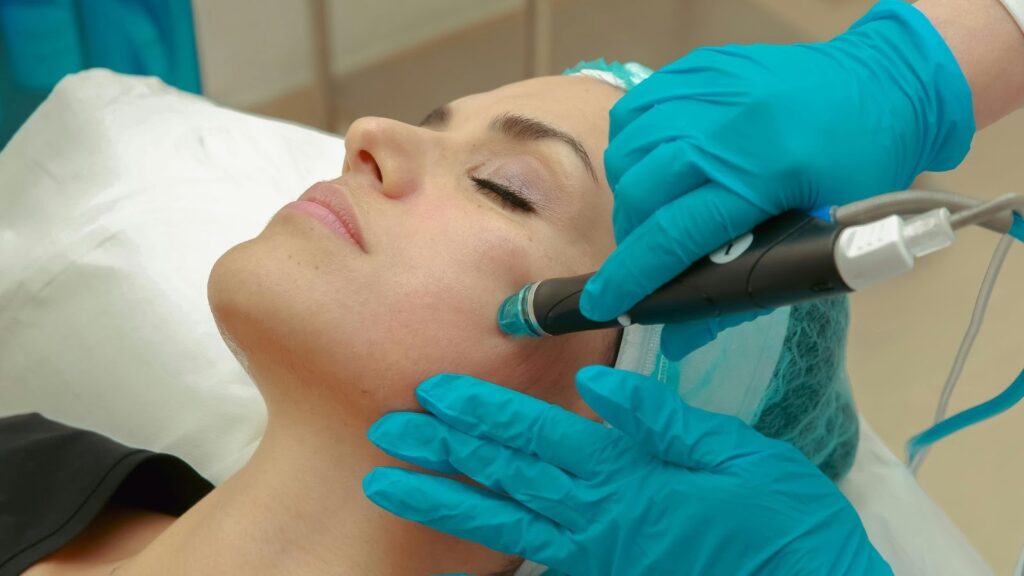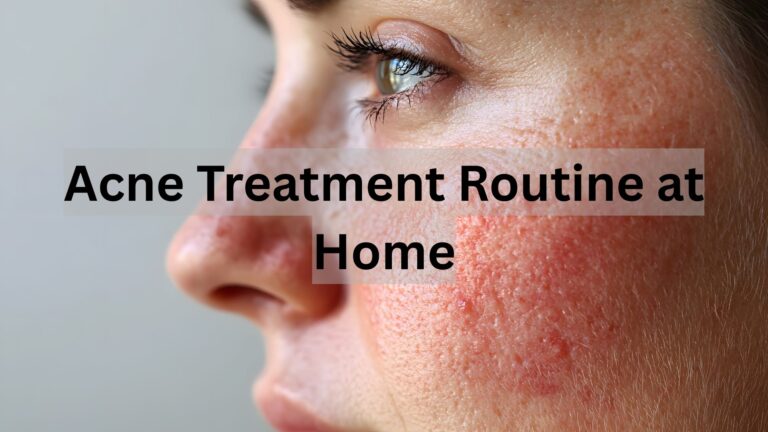Acne is one of the most common skin concerns worldwide, affecting teenagers and adults alike. From whiteheads and blackheads to inflamed pimples, acne can affect anyone regardless of gender or skin type. Its physical effects are often accompanied by emotional stress, affecting confidence and self-esteem. Fortunately, with the right home skincare routine, lifestyle habits, and preventive measures, you can manage acne effectively without the need for expensive or harsh treatments.
This comprehensive guide will walk you through a step-by-step acne treatment routine at home, suitable for all skin types, including sensitive, oily, combination, and dry skin. You’ll also learn supplementary tips, lifestyle adjustments, and natural remedies to accelerate results and maintain healthy, clear skin.

Understanding Acne: Causes and Triggers
Acne develops when hair follicles become clogged with oil, dead skin cells, and bacteria, leading to pimples, blackheads, and whiteheads. Understanding the underlying causes helps in selecting the right treatments and preventing future breakouts.
Common Causes of Acne
- Excess Sebum Production – Overactive oil glands can cause clogged pores and contribute to acne formation.
- Bacterial Growth – Propionibacterium acnes, the bacteria present on skin, can trigger inflammation.
- Hormonal Changes – Puberty, menstrual cycles, pregnancy, and stress can lead to hormonal fluctuations that worsen acne.
- Dietary Factors – High-sugar foods, dairy products, and processed foods may aggravate acne in some individuals.
- Environmental Factors – Pollution, humidity, and dirt accumulation can clog pores.
- Lifestyle Factors – Inadequate sleep, stress, and improper skincare routines can exacerbate breakouts.
By addressing these factors and adopting a holistic home routine, acne can be managed effectively across all skin types.
Daily Acne Treatment Routine
A structured daily routine is key to managing acne. Each step in your skincare routine should focus on cleansing, treatment, hydration, and protection.
Step 1: Gentle Cleansing
Cleansing is the foundation of any acne routine. It removes dirt, oil, and bacteria without stripping the skin.
Tips for Effective Cleansing:
- Use a gentle, sulfate-free cleanser suitable for your skin type.
- Wash your face twice daily: once in the morning and once before bedtime.
- Avoid harsh scrubs, which can cause micro-tears and worsen inflammation.
- Pat the skin dry with a clean, soft towel rather than rubbing.
Benefits: Prevents clogged pores, reduces inflammation, and maintains the skin’s natural barrier.
Step 2: Targeted Acne Treatments
After cleansing, applying acne-specific treatments is crucial to control bacteria, reduce oil, and promote healing.
Effective Ingredients for All Skin Types:
- Salicylic Acid (BHA): Penetrates pores, dissolves excess oil, and exfoliates dead skin cells. Ideal for blackheads and mild acne.
- Benzoyl Peroxide: Reduces bacteria and inflammation, effective for inflamed pimples. Start with lower concentrations (2.5–5%).
- Adapalene (Retinoids): Promotes cell turnover, prevents clogged pores, and improves skin texture. Suitable for all ages.
- Niacinamide: Anti-inflammatory and regulates sebum production, also helps reduce redness and post-acne marks.
- Tea Tree Oil: A natural antibacterial option for mild acne. Use diluted to prevent irritation.
Application Tips:
- Apply spot treatments directly on pimples or thin layers over problem areas.
- Introduce new products gradually to monitor skin reactions.
- Use non-comedogenic products to avoid further clogging pores.
Step 3: Hydration with Moisturizers
Moisturizing is essential, even for oily or acne-prone skin. Well-hydrated skin balances oil production and prevents excessive dryness caused by acne treatments.
Choosing the Right Moisturizer:
- Opt for oil-free, non-comedogenic formulas.
- Look for hyaluronic acid, glycerin, or aloe vera for lightweight hydration.
- Apply after acne treatments to soothe irritation and maintain the skin barrier.
Benefits: Reduces dryness, maintains elasticity, and enhances overall skin health.
Step 4: Sun Protection
Sunscreen is vital to prevent hyperpigmentation and skin damage caused by sun exposure, which can worsen acne scars.
Sunscreen Tips:
- Use broad-spectrum SPF 30 or higher every day.
- Choose oil-free, non-comedogenic sunscreens designed for acne-prone skin.
- Reapply every 2–3 hours if exposed to sunlight or after sweating.
Benefits: Prevents sun-induced inflammation, protects sensitive skin, and helps fade acne marks over time.
Weekly Acne Care Enhancements
In addition to daily routines, certain weekly practices help exfoliate, detoxify, and calm acne-prone skin.
1. Exfoliation
Exfoliation removes dead skin cells, unclogs pores, and improves the absorption of acne treatments.
Methods:
- Chemical exfoliation: AHAs (glycolic acid, lactic acid) for gentle surface exfoliation, and BHAs (salicylic acid) for deep pore cleansing.
- Physical exfoliation: Use very gentle scrubs once per week to avoid irritation.
Frequency: 1–2 times per week for sensitive skin, 2–3 times for resilient skin types.
Benefits: Smooths skin texture, prevents new breakouts, and brightens the complexion.
2. Face Masks
Face masks can provide intensive treatment for oily, congested, or inflamed skin.
Types of Masks:
- Clay masks: Absorb excess oil and unclog pores.
- Charcoal masks: Detoxify skin and remove impurities.
- Aloe vera masks: Calm inflammation and promote healing.
- Honey masks: Antibacterial and soothing for sensitive acne-prone skin.
Frequency: Once or twice a week depending on skin tolerance.
3. Spot Treatments
For persistent or inflamed pimples, targeted spot treatments reduce swelling and speed up healing.
Effective Options:
- Benzoyl peroxide gels
- Sulfur-based treatments
- Diluted tea tree oil
Tips: Apply directly on affected areas and avoid overusing to prevent irritation.
Lifestyle Factors That Complement Acne Treatment
1. Healthy Diet
Nutrition affects skin health. Foods high in sugar, dairy, or processed ingredients may trigger acne in some individuals.
Recommended:
- Fresh fruits and vegetables
- Lean proteins (chicken, fish, tofu)
- Whole grains and fiber-rich foods
- Hydration: Drink 8–10 glasses of water daily
Tip: Maintain a food diary to identify and avoid potential acne triggers.
2. Stress Management
Stress can increase cortisol, which may exacerbate acne.
Effective Techniques:
- Yoga, meditation, or deep-breathing exercises
- Regular exercise
- Adequate sleep (7–9 hours per night)
Benefits: Reduces hormonal triggers of acne and promotes better healing.
3. Hygiene Practices
Prevent bacterial contamination by maintaining good hygiene:
- Avoid touching your face frequently
- Wash pillowcases, towels, and makeup brushes regularly
- Sanitize phone screens that come in contact with your face
4. Consistency and Patience
Acne treatments require time and regularity. Visible improvements may take 4–12 weeks.
Tips for Consistency:
- Stick to your routine
- Track improvements and adjust based on skin response
- Avoid switching products too frequently
Common Acne Myths Debunked
- Oily skin should skip moisturizer: Wrong. Hydration prevents rebound oil production.
- Popping pimples helps heal faster: False. It can lead to scarring and infection.
- Natural remedies alone cure acne: Only partially true. They help but work best with a structured routine.
Understanding these facts helps prevent mistakes that can worsen acne.
When to Consult a Dermatologist
Home routines work for mild to moderate acne. Seek professional advice if:
- Acne is severe or cystic
- There is painful nodules, persistent inflammation, or scarring
- Over-the-counter treatments cause allergic reactions or excessive irritation
- You require personalized treatments like prescription retinoids or oral medications
Early intervention can prevent long-term damage and accelerate healing.
Conclusion: Achieve Clear Skin at Home
An effective acne treatment routine at home combines gentle cleansing, targeted treatments, proper hydration, sun protection, exfoliation, and lifestyle adjustments. By following a consistent, well-structured regimen and monitoring skin response, you can reduce breakouts, prevent scarring, and achieve a healthy, radiant complexion.
Begin today with these steps, maintain patience and consistency, and embrace a holistic approach to clear, acne-free skin.


